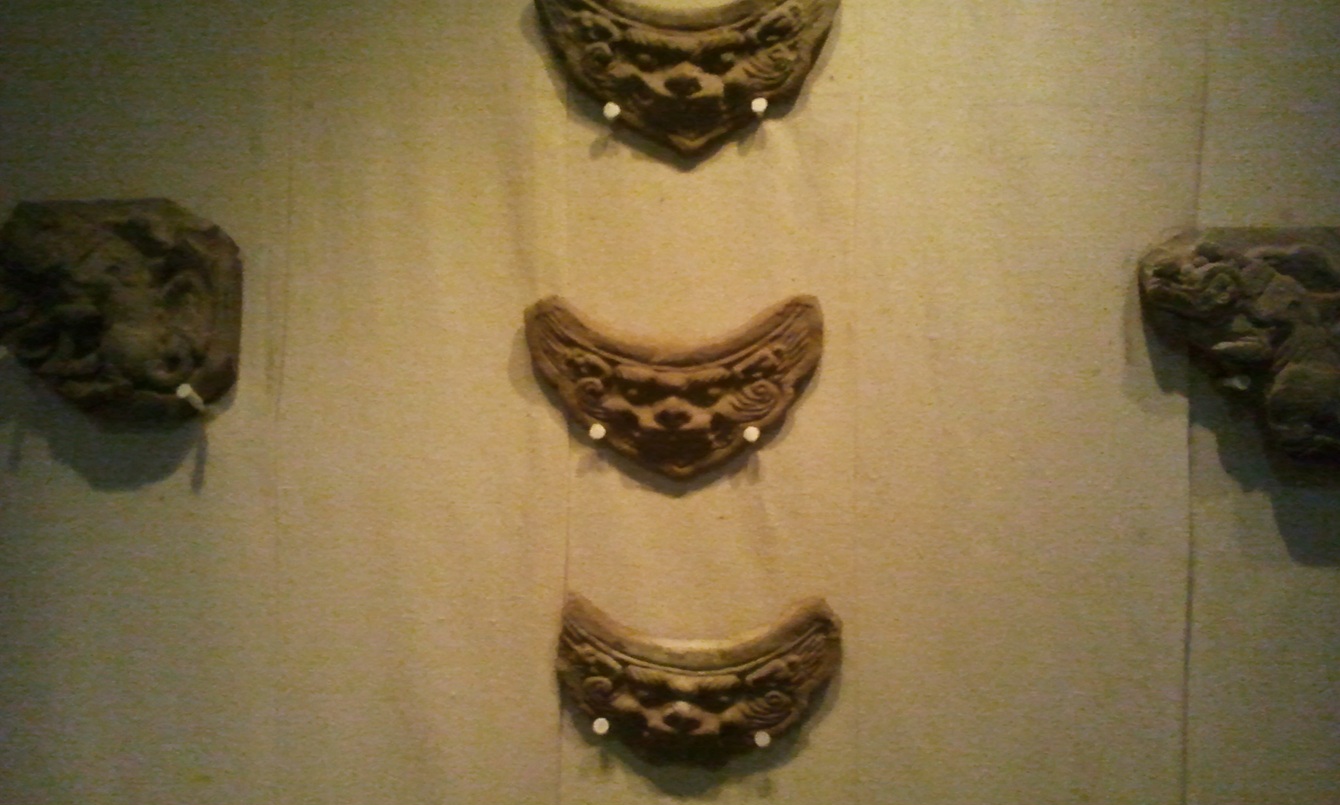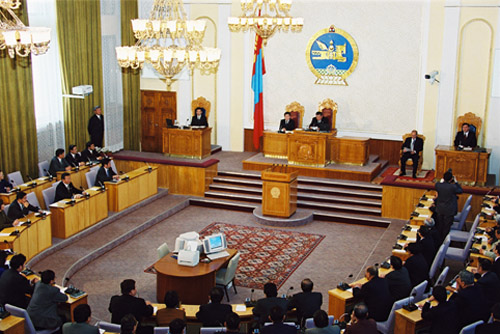|
Supreme Court Of Mongolia
The Supreme Court of Mongolia is the highest court in the judicial system of Mongolia, and is generally the court of last resort for non-constitutional matters. It is established by Article 48(1) of the Constitution of Mongolia. The 1992 Constitution states in Article 50(1) that "the Supreme Court shall be the highest judicial organ".Montsame News Agency. ''Mongolia''. Montsame News Agency Foreign Service Office, 2006, ; p. 45 The Supreme Court has jurisdiction over serious criminal matters, receives appeals from lower-instance courts. It also hears appeals from the Constitutional Court with respect to the protection of the rule of law and human rights and from the Prosecutor General. The Court may also provide official interpretations of Mongolian law, except for the Constitution of Mongolia. Official interpretations are made through a special procedure referred to as a 'sitting en banc'. Justices of the Supreme Court of Mongolia are appointed by the President of Mongolia af ... [...More Info...] [...Related Items...] OR: [Wikipedia] [Google] [Baidu] |
Ulaanbaatar
Ulaanbaatar (; mn, Улаанбаатар, , "Red Hero"), previously anglicized as Ulan Bator, is the capital and most populous city of Mongolia. It is the coldest capital city in the world, on average. The municipality is located in north central Mongolia at an elevation of about in a valley on the Tuul River. The city was originally founded in 1639 as a nomadic Buddhist monastic center, changing location 28 times, and was permanently settled at its current location in 1778. During its early years, as Örgöö (anglicized as Urga), it became Mongolia's preeminent religious center and seat of the Jebtsundamba Khutuktu, the spiritual head of the Gelug lineage of Tibetan Buddhism in Mongolia. Following the regulation of Qing-Russian trade by the Treaty of Kyakhta in 1727, a caravan route between Beijing and Kyakhta opened up, along which the city was eventually settled. With the collapse of the Qing Empire in 1911, the city was a focal point for independence efforts, leading ... [...More Info...] [...Related Items...] OR: [Wikipedia] [Google] [Baidu] |
President Of Mongolia
The president of Mongolia ( mn, Монгол Улсын Ерөнхийлөгч, ''Mongol Ulsyn Yerönkhiilögch'') is the executive head of state of Mongolia.Montsame News Agency. ''Mongolia''. 2006, , p. 42 The current president is Ukhnaagiin Khürelsükh. Political parties with representation in the State Great Khural nominate candidates. The president was originally limited to two four-year terms, but this was changed to a non-renewable six-year term starting with the 2021 presidential election. The president can be removed from office if two-thirds of the Khural find them guilty of abusing their powers or violating their oath.Montsame News Agency. ''Mongolia''. 2006, , p. 43 Before inauguration, however, the president-elect must suspend their membership of any political party. Powers of the president *Nominating a candidate for the office of Prime Minister, who is then approved or rejected by the State Great Khural (parliament). This is a ceremonial responsibility, as ... [...More Info...] [...Related Items...] OR: [Wikipedia] [Google] [Baidu] |
Constitution Of Mongolia
The current Constitution of Mongolia (, ''Mongol Ulsyn Ündsen Khuuli'', "Fundamental Law of Mongolia") was adopted on 13 January 1992, put into force on 12 February, and amended in 1999, 2000 and 2019. The new constitution established a representative democracy in Mongolia, guaranteeing freedom of religion, rights, travel, expression, unalienable rights, government setup, election cycle, and other matters. It was written after the Mongolian Revolution of 1990 and dissolved the People's Republic of Mongolia. It consists of a preamble followed by six chapters divided into 70 articles. It is very close to and/or inspired by Western constitutions in terms of freedom of press, inalienable rights, freedom to travel, and other rights. Constitutional history Previous constitutions had been adopted in 1924, 1940 and 1960. Chapters Chapter One Declares the sovereignty and territorial integrity of the Mongolian state. Defines relationship between religion and state. Defines Mongolian e ... [...More Info...] [...Related Items...] OR: [Wikipedia] [Google] [Baidu] |
Mongolia
Mongolia; Mongolian script: , , ; lit. "Mongol Nation" or "State of Mongolia" () is a landlocked country in East Asia, bordered by Russia to the north and China to the south. It covers an area of , with a population of just 3.3 million, making it the world's most sparsely populated sovereign nation. Mongolia is the world's largest landlocked country that does not border a closed sea, and much of its area is covered by grassy steppe, with mountains to the north and west and the Gobi Desert to the south. Ulaanbaatar, the capital and largest city, is home to roughly half of the country's population. The territory of modern-day Mongolia has been ruled by various nomadic empires, including the Xiongnu, the Xianbei, the Rouran, the First Turkic Khaganate, and others. In 1206, Genghis Khan founded the Mongol Empire, which became the largest contiguous land empire in history. His grandson Kublai Khan conquered China proper and established the Yuan dynasty. After the co ... [...More Info...] [...Related Items...] OR: [Wikipedia] [Google] [Baidu] |
Constitutional Court Of Mongolia
The Constitutional Court of Mongolia is the highest court in Mongolia responsible for the interpretation of the constitution. Thus, the Constitutional Court has supreme power over the implementation of the Mongolian Constitution. The Court delivers decisions on violations of constitutional procedures and resolves constitutional disputes. All governmental action is subject to the Court.Montsame News Agency. ''Mongolia''. 2006, , p. 42 The Constitutional Tsets consists of nine members. A member of the Tsets must be a citizen of Mongolia who has high legal and political professional standing, is without a criminal record against and has reached 40 years of age. In accordance with the law, the members of the Constitutional Court are appointed by the State Great Hural for a term of six years, with three of them to be nominated by the State Great Hural, three by the President of Mongolia and three by the Supreme Court of Mongolia. Questions regarding laws other than the Constitutio ... [...More Info...] [...Related Items...] OR: [Wikipedia] [Google] [Baidu] |
Judicial General Council Of Mongolia
The Judicial General Council of Mongolia (, ''Mongol Ulsyn Shüükhiin Yerönkhii Zövlöl'') is an organ of the Mongolian judiciary mandated by the Constitution of Mongolia to maintain the independence of the judiciary, represent the Mongolian judiciary and advise on the selection and removal of judicial officers. Background The Council consists of 5 members being appointed by the President of Mongolia. In fulfilling its constitutional mandate, the Council submits recommendations to the State Great Khural and the President on the establishment and structure of the court system, their personnel, appointments and release of judicial officers. Further, it selects and examines judicial officers, upgrades their skills and qualifications through training, and distributes budgets and controls over expenditure of funds. The council has been at the centre of ongoing judicial reform efforts in Mongolia. It has received assistance from the United States Agency for International Development ... [...More Info...] [...Related Items...] OR: [Wikipedia] [Google] [Baidu] |
National Supreme Courts
National may refer to: Common uses * Nation or country ** Nationality – a ''national'' is a person who is subject to a nation, regardless of whether the person has full rights as a citizen Places in the United States * National, Maryland, census-designated place * National, Nevada, ghost town * National, Utah, ghost town * National, West Virginia, unincorporated community Commerce * National (brand), a brand name of electronic goods from Panasonic * National Benzole (or simply known as National), former petrol station chain in the UK, merged with BP * National Car Rental, an American rental car company * National Energy Systems, a former name of Eco Marine Power * National Entertainment Commission, a former name of the Media Rating Council * National Motor Vehicle Company, Indianapolis, Indiana, USA 1900-1924 * National Supermarkets, a defunct American grocery store chain * National String Instrument Corporation, a guitar company formed to manufacture the first resonator g ... [...More Info...] [...Related Items...] OR: [Wikipedia] [Google] [Baidu] |
Government Of Mongolia
Politics of Mongolia takes place in a framework of a Semi-presidential system, semi-presidential Multi-party system, multi-party representative democracy. Executive power is exercised by the Prime Minister of Mongolia, Prime Minister, who is the head of government, and the Cabinet of Mongolia, Cabinet. The President of Mongolia, President is the head of state, but holds limited authority over the executive branch of the government, unlike full presidential republics like the United States. Legislative power is vested in parliament. The Judiciary is independent of the executive and the legislature. Socialist period and single party government Shortly after the Outer Mongolian Revolution of 1921, Mongolian Revolution of 1921, Mongolia adopted a one-party socialist republican Mongolian People's Republic, constitution modelled after the Politics of the Soviet Union, Soviet Union; only the communist party — the Mongolian People's Party, Mongolian People's Revolutionary Party (MPRP) ... [...More Info...] [...Related Items...] OR: [Wikipedia] [Google] [Baidu] |
Law Of Mongolia
Law is a set of rules that are created and are enforceable by social or governmental institutions to regulate behavior,Robertson, ''Crimes against humanity'', 90. with its precise definition a matter of longstanding debate. It has been variously described as a science and as the art of justice. State-enforced laws can be made by a group legislature or by a single legislator, resulting in statutes; by the executive through decrees and regulations; or established by judges through precedent, usually in common law jurisdictions. Private individuals may create legally binding contracts, including arbitration agreements that adopt alternative ways of resolving disputes to standard court litigation. The creation of laws themselves may be influenced by a constitution, written or tacit, and the rights encoded therein. The law shapes politics, economics, history and society in various ways and serves as a mediator of relations between people. Legal systems vary between jurisdictions, ... [...More Info...] [...Related Items...] OR: [Wikipedia] [Google] [Baidu] |
Judiciary Of Mongolia
The judiciary of Mongolia is made up of a three-tiered court system (first instance, appellate, supreme court) divided into three branches (civil, criminal, administrative cases). For questions of constitutional law there is a separate constitutional court. Besides there are forms of alternative dispute resolution. First instance First instance court types are: * District first instance court for civil cases ( mn, дүүргийн Иргэний хэргийн анхан шатны шүүх / дүүргийн ИХАШ шүүх) * District first instance court for criminal cases () ** Number: 4 each; named after Ulaanbaatar city districts. * Inter-soum first instance court for civil cases () * Inter-soum first instance court for criminal cases () ** Number: 21 each; named after an aimag. * Inter-soum court () ** Number: 8; each named after an aimag's soum. * First instance court for administrative cases (захиргааны хэргийн анхан шатны шүүх / ЗХ� ... [...More Info...] [...Related Items...] OR: [Wikipedia] [Google] [Baidu] |
1927 Establishments In Mongolia
Nineteen or 19 may refer to: * 19 (number), the natural number following 18 and preceding 20 * one of the years 19 BC, AD 19, 1919, 2019 Films * ''19'' (film), a 2001 Japanese film * ''Nineteen'' (film), a 1987 science fiction film Music * 19 (band), a Japanese pop music duo Albums * ''19'' (Adele album), 2008 * ''19'', a 2003 album by Alsou * ''19'', a 2006 album by Evan Yo * ''19'', a 2018 album by MHD * ''19'', one half of the double album ''63/19'' by Kool A.D. * ''Number Nineteen'', a 1971 album by American jazz pianist Mal Waldron * ''XIX'' (EP), a 2019 EP by 1the9 Songs * "19" (song), a 1985 song by British musician Paul Hardcastle. * "Nineteen", a song by Bad4Good from the 1992 album ''Refugee'' * "Nineteen", a song by Karma to Burn from the 2001 album ''Almost Heathen''. * "Nineteen" (song), a 2007 song by American singer Billy Ray Cyrus. * "Nineteen", a song by Tegan and Sara from the 2007 album '' The Con''. * "XIX" (song), a 2014 song by Slipknot. ... [...More Info...] [...Related Items...] OR: [Wikipedia] [Google] [Baidu] |


